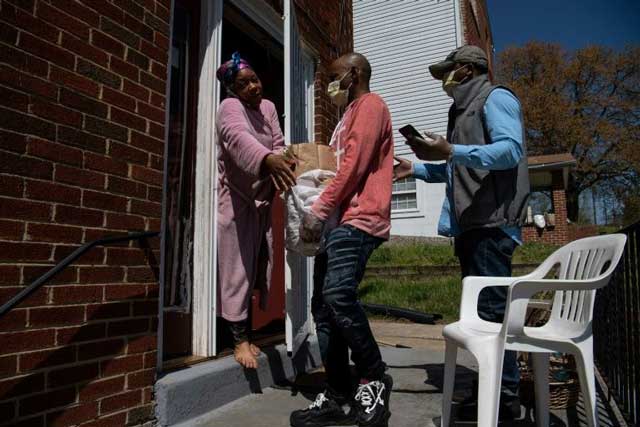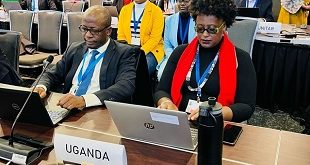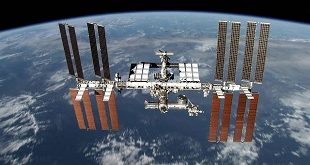
Washington, United States | AFP | A mask on his face and gloves on his hands, Anthony Lorenzo Green navigated a silver Cadillac through the streets of northeast Washington, delivering groceries to needy people, no strings attached.
He knew where to go thanks to the efforts of a mutual aid network set up in the US capitol. The network’s volunteers coordinate helping underserved people — for whom the coronavirus has made life newly precarious — get whatever they need: food, toiletries, language translation, even a phone call to check on how they’re faring.
“You have folks that get up every day that feel like there’s no love here,” said Green, a neighborhood commissioner whose work as a consultant has dried up as the pandemic hit. “But in these moments, they’re reminded that it does exist.”
The coronavirus has killed more than 14,500 people in the United States and put around 10 million out of work while causing a shortage of crucial supplies for healthcare workers fighting the disease.
With local governments across the country struggling to respond, mutual aid groups have stepped into the fray, seeking out and responding to the needs of vulnerable and underserved communities — like poor people, the elderly, immigrants and African Americans.
“We have people calling to mutual aid hotlines because they don’t have any money and they can’t feed their family,” said Makia Green, an organizer for one of several mutual aid groups in the capitol, who is not related to the commissioner.
“Right now, I know I have more requests than I can fill, and so we’re just taking it one day at a time.”
– Scarce masks –
A longstanding organizing strategy of the political left, mutual aid groups have come and gone through the years in the US.
“The term ‘mutual aid’ is usually used to indicate supporting each other with basic needs with a shared understanding (that) the government and corporations are not going to help us and maybe are also making things worse,” said Dean Spade, a professor at Seattle University School of Law who has taught on the groups.
Many of the mutual aid groups have formed in recent weeks specifically to help out amid the pandemic, with their efforts targeted at the inequities the virus has brought to light.
“It is truly remarkable that we’ve seen such a failure at the highest levels of our government to provide basic safety equipment to people who are quite literally saving our lives,” said Sarah Heydemann, who manages the Mask Crusaders chapter in Washington.
One of 20 chapters in the country, Mask Crusaders use spreadsheets to coordinate getting donated masks to workers whose jobs put them at risk of getting the virus.
– Overwhelming need –
Congress has passed a $2.2 trillion spending bill giving cash to Americans and bolstering unemployment assistance, but organizers in Washington fear the official response will leave out communities with long histories of neglect and persecution.
“When there’s a really large health scare like the coronavirus, the people who are most at risk, the people who are going to be impacted the greatest, are going to be poor black and brown people,” said Alexis McKenney, who coordinates mutual aid for two of the capital’s poorest wards, including where Green delivers.
Some city government agencies have even referred their clients to the network, which is struggling to cope with demand.
“People have called the hotline two or three times as they’ve needed more,” McKenney said. “We know that we can’t feed everyone in the city.”
– Laying the groundwork –
With mounting evidence that the virus is disproportionately killing black Americans — who make up a majority of the 27 dead in Washington — mutual aid leaders say they want to extend their effort beyond immediate relief and into political organizing to address why some communities are harder hit than others.
“If we do this right, after this is done, nothing will be the same,” said Aja Taylor, who on social media has circulated a survey gauging demands to be made on the city government. “Mutual aid is an opportunity to be politicized through actions.”
Making his way through quiet neighborhoods to households that had called for help, the biggest obstacle Green faced was figuring out how to hand over the groceries while keeping far enough away from people so that the disease couldn’t be transmitted.
Patricia Smith, 63, surveyed a brown paper bag delivered by Green containing jelly, toilet paper and a loaf of bread. Despite struggling with back pain, she refused help in carrying the bag for fear of letting anyone near her.
With the bus and subway schedule reduced, “it’s hard to get the food, period,” she said. “At least I got the bread.”
 The Independent Uganda: You get the Truth we Pay the Price
The Independent Uganda: You get the Truth we Pay the Price


